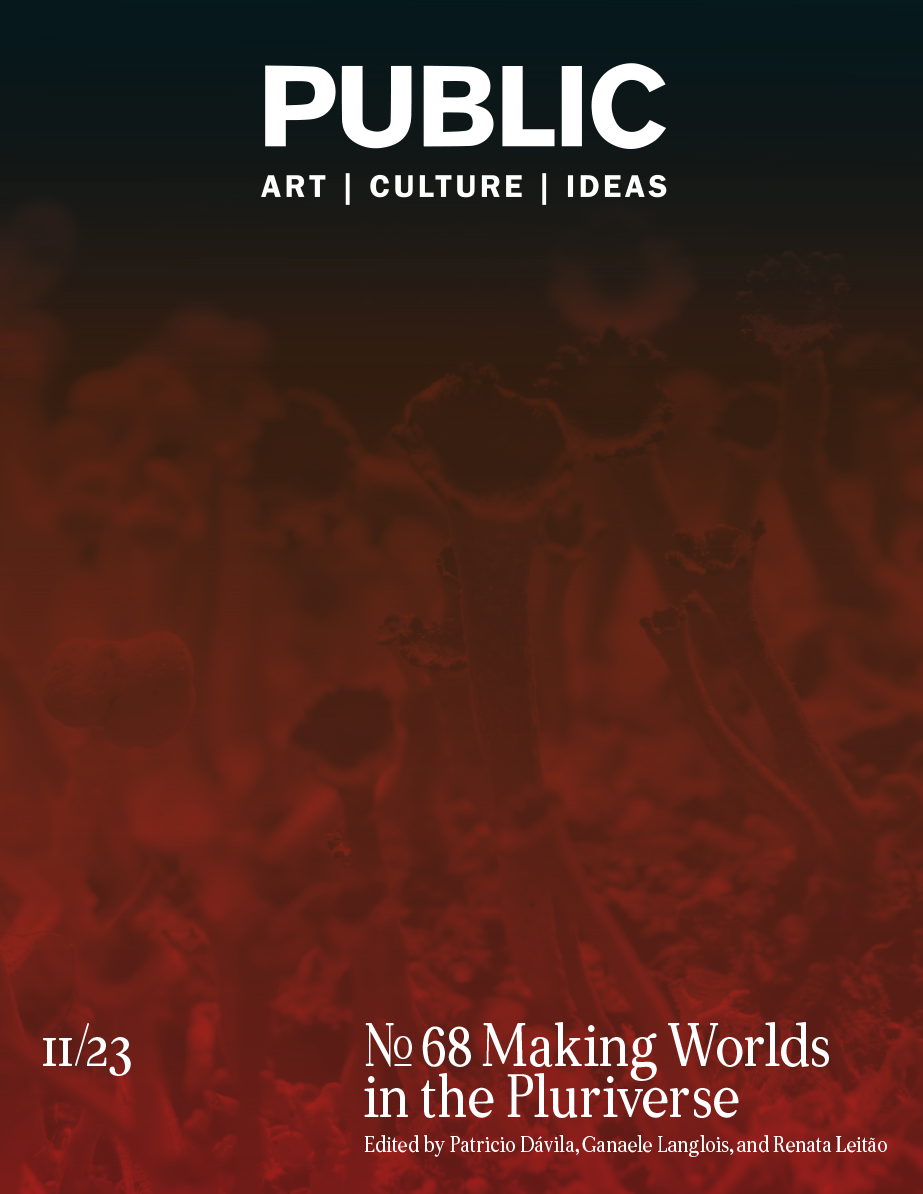- Home
- A-Z Publications
- Public
- Previous Issues
- Volume 24, Issue 48, 2013
Public - Volume 24, Issue 48, 2013
Volume 24, Issue 48, 2013
-
-
That's All Folks…
More LessAuthors: Christine Davis and Scott MacKenizeAbstractIntroduction to the issue
-
-
-
Betrayal: The thanatocracy (1974)
More LessAbstractIn this article the author reframes the philosophy of science and examines its central role in the philosophical project. For Serres both a new science and a new philosophy must be forged that transcend the endpoints both endeavours face.
-
-
-
The end of the world (as we know it)
More LessBy Slavoj ŽižekAbstractThis public lecture by SlavojŽižek was delivered in Toronto's City Hall Council Chambers on 29 September 2012 as part of the Until the End of the World symposium (coorganized by Christine Davis, Scott MacKenzie and Janine Marchessault on behalf of the Public Access Collective), as part of the site-specific Nuit Blanche exhibition 'The Museum for the End of the World'.
-
-
-
The end of the humanities
More LessBy Toby MillerAbstract'The end of the humanities' is clearly a silly title. It risks mockery for several reasons, the most obvious one being that it is easily disproved by history. Tomorrow you will wake up and there will still be humanities. And there may be many tomorrows. But I actually think the end is coming, at least in the United States. The US version of the humanities is dying, if not rhetorically (it's hard to shut them up) then numerically.
-
-
-
All that's frozen melts into air: Arctic cinemas at the end of the world
More LessAuthors: Scott MacKenzie and Anna Westerståhl StenportAbstractDrawing on the concepts of the sublime and the spectacle, this article examines the ways in which global cinemas have often mobilized the trope of the Arctic as the end of the world. Drawing on a radically disparate set of films, including examples from Swedish and Danish art cinema; Cold War documentaries made or supported by the Danish and American governments for both general release and television; 1950s 'True Life Adventures' nature documentaries made by the Disney studio; Creation, a work by American avant-garde film-maker Stan Brakhage; and To the Arctic, a recent IMAX 3D film. We argue that most of these works eradicate the material, cultural and geographical specificity of the Arctic for political and ideological reasons.
-
-
-
A beautiful movie about the end of the World. Director's Statement
More LessAbstractThe statement below by Lars von Trier on his end of the world film Melancholia (2011) is one of a long line of manifestos, statements, and proclamations von Trier has issued before the release of each of his films. While proclaiming that he wanted to embrace German Romanticism, von Trier's main character Justine (Kirsten Dunst) is far more enveloped by a sense of ennui about the world ending.
-
-
-
OFFSHORE: Extreme oil and our disappearing future
More LessAbstractAs we enter the age of the Anthropocene where human activity is fundamentally altering our relationship with the bios, the promise of the future that had been heralded by modernity is rapidly being undermined. The article reflects on our diminishing sense of the future, the end of petroleum and an interactive website entitled OFFSHORE that explores our dark addiction.
-
-
-
Communism and the end of the world
More LessAbstractDrawing on Fredric Jameson's thesis that it is easier to imagine the end of the world than the end of capitalism, this article examines recent representations of communism, anti-communism, and the end of the world, in popular film and television, and argues that both work towards re-enforcing the utopian view that there is no viable alternative to liberal democracy and capitalism. In the context of the ongoing financial crisis and global political uprisings, representations of the apocalypse are being paralleled with a return to images of the 'communist threat'. Here, it is argued that such images aim to dissuade people from thinking about alternatives to the existing system. This article concludes with a discussion of recent reconsiderations of the 'communist hypothesis'.
-
-
-
Algorithms for the extinction event
More LessAuthors: Arthur Kroker, Marilouise Kroker and Jackson 2bearsAbstractThe authors explore the kinetic energy of end times in a digital age based on their recent video After the Drones, produced with artist Jackson 2bears.
-
-
-
Separation, death, the thing, Freud, Lacan, and the missed encounter
More LessAbstractThe author re-examines the relationship between Freudian and Lacanian psychoanalytic theories of the death drive and how they relate to our conceptualization of one's own end.
-
-
-
Selected Songs for the end of the world
More LessBy Alan ZweigAbstractList of songs with a selection of lyrics all dealing with the apocalypse.
-
-
-
Ori Gersht: History Repeating: Museum of Fine Arts, Boston
More LessAbstractReview of: Ori Gersht: History Repeating Museum of Fine Arts, Boston
-
-
-
Artificial Hells: Participatory Art and the Politics of Spectatorship by Claire Bishop
More LessAbstractReview of: Artificial Hells: Participatory Art and the Politics of Spectatorship by Claire Bishop
-
-
-
Living As Form edited by Nato Thompson
More LessAbstractReview of: Living As Form edited by Nato Thompson
-
Most Read This Month

Most Cited Most Cited RSS feed
-
-
NIGHTSENSE
Authors: Jennifer Fisher and Jim Drobnick
-
- More Less

